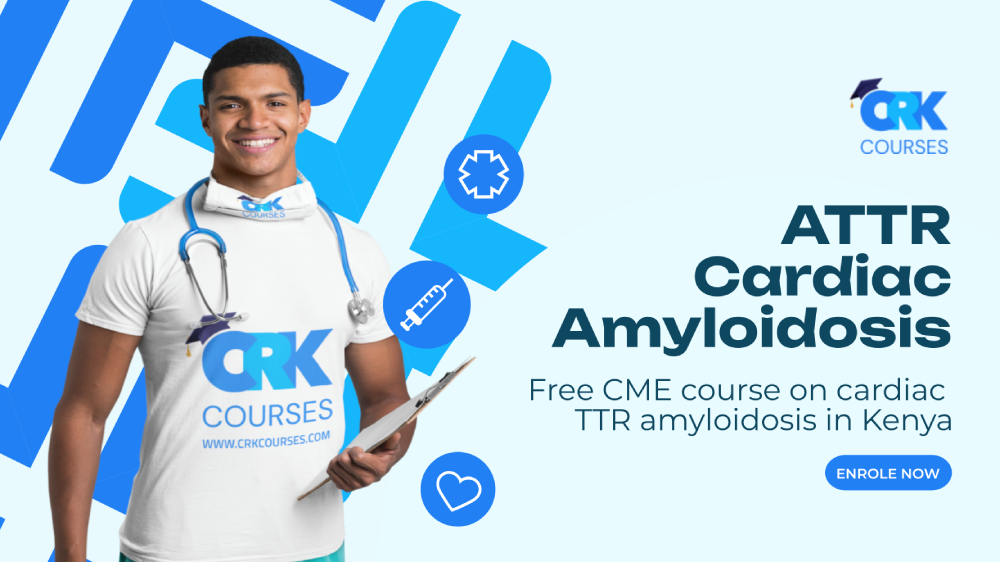Launching Kenya’s First Quality Improvement Program on ATTR Cardiac Amyloidosis
Introduction: A Landmark for Cardiac Amyloidosis in Africa
The Kenya ATTR Cardiac Amyloidosis Program marks the beginning of a new chapter in rare disease care across Africa. Cardiac amyloidosis has long remained under-recognized, even though genetic variants common in African populations increase the risk significantly. As a result, patients in Kenya and beyond continue to face late diagnoses and limited treatment options.
To close this diagnostic and treatment blindspot, CRK NGO is launching Kenya’s first Quality Improvement Program on ATTR Cardiac Amyloidosis. This initiative is independently sponsored by Global Bridges and Mayo Clinic, with strong support from the Kenya Cardiac Society, Pharmacy and Poisons Board (PPB), Kenya Medical Practitioners and Dentists Council (KMPDC), and the Clinical Officers Council (COC).
👉 Enroll in the free, CPD-accredited ATTR Cardiac Amyloidosis course here
Why the Kenya ATTR Cardiac Amyloidosis Program Matters
ATTR cardiac amyloidosis (ATTR-CM) is often misdiagnosed as hypertensive heart disease, aortic stenosis, or dilated cardiomyopathy. Consequently, many patients wait more than two years from the onset of symptoms to an accurate diagnosis. This delay denies them the chance to access effective treatments in time.
The program addresses these critical gaps by:
Enhancing early recognition of red flags in clinical exams, ECGs, and echocardiography.
Training healthcare providers to use diagnostic algorithms and modern tools such as bone scintigraphy and genetic testing.
Building multidisciplinary collaboration to improve patient care and outcomes.
A Free, CPD-Accredited Online Training for Healthcare Providers
The Kenya ATTR Cardiac Amyloidosis Program is designed with accessibility in mind. Specifically, it is:
Free of charge for all participants.
Fully online, ensuring healthcare providers across Kenya and Africa can join without travel barriers.
CPD-accredited, so learners earn valuable continuing education credits.
The training is open to:
✔ Cardiologists
✔ Clinical Officers
✔ General Practitioners
✔ Radiologists & Sonographers
In addition, targeting these frontline professionals ensures more patients will be diagnosed earlier, referred appropriately, and managed effectively.
Ready to get started? Join the free ATTR Cardiac Amyloidosis program now and earn CPD points while improving patient care.
Course Structure: Building Skills Step by Step
The course follows a structured, practical curriculum:
Module 1: Foundations of ATTR Cardiac Amyloidosis in Africa
Introduction to amyloidosis and its subtypes
Hereditary ATTR in African populations
Barriers to diagnosis and future directions
Module 2: Recognizing Red Flags in Amyloidosis Patients
ECG clues such as low voltage and conduction changes
Echocardiographic features, including apical sparing
Clinical presentations and extracardiac manifestations
Module 3: Confirming the Diagnosis of ATTR-CM
Monoclonal protein testing to exclude AL amyloidosis
Bone scintigraphy and the Perugini grading system
Module 4: Subtype Classification for ATTR Amyloidosis in Kenya
Tissue biopsy and genetic testing
Role of cardiac MRI in staging and prognosis
Module 5: Staging, Treatment, and Monitoring
Use of NT-proBNP and troponins for staging
Tafamidis and RNA silencers in management
Long-term monitoring and follow-up strategies
Module 6: Clinical Application and Case Studies
Real-world diagnostic challenges
Complex case discussions
Multidisciplinary problem-solving approaches
Impact Beyond Training: Driving Policy and Quality Improvement
The Kenya ATTR Cardiac Amyloidosis Program goes beyond education. Moreover, it strengthens national health systems by:
Developing a Kenya-specific diagnostic algorithm for ATTR-CM.
Advocating for the inclusion of cardiac amyloidosis in national NCD strategies and UHC frameworks.
Establishing a registry to capture local data on the disease burden.
Creating a task force to sustain progress and foster regional collaboration.
Global Collaboration, Local Leadership in Cardiac Amyloidosis
By partnering with Global Bridges and the Mayo Clinic, and securing local support from the Kenya Cardiac Society, PPB, KMPDC, and COC, this initiative ensures that global expertise is adapted to Kenya’s context.
As a result, Kenya has become the first African country to roll out a systematic, accredited, and collaborative approach to tackling ATTR cardiac amyloidosis.
Conclusion: A Turning Point for Cardiac Amyloidosis in Africa
For too long, cardiac amyloidosis in Africa has been a hidden epidemic. It is often misdiagnosed, left untreated, and ignored in policy frameworks. With the launch of the Kenya ATTR Cardiac Amyloidosis Program, CRK NGO and its partners are pioneering a new era of awareness, education, and patient care.
By training cardiologists, clinical officers, general practitioners, radiologists, and sonographers, this initiative will shorten diagnostic delays, improve patient survival, and establish Kenya as a continental leader in amyloidosis research and care.
Don’t miss this opportunity to advance your skills. Register today for Kenya’s first Quality Improvement Program on ATTR Cardiac Amyloidosis.
CRK Courses: Empowering Healthcare Providers in Africa
At CRK NGO, our commitment to advancing healthcare goes beyond research. Through our e-learning platform, CRK Courses, we provide capacity building for over 15,000 Kenyan and African healthcare providers. With 5 years of experience delivering high-quality, accredited training, our platform has become a trusted hub for professional development across the continent.
By offering free, CPD-accredited programs such as the ATTR Cardiac Amyloidosis Quality Improvement Program, we ensure that cardiologists, clinical officers, general practitioners, radiologists, and sonographers can access world-class training anytime, anywhere.
FAQs
What is ATTR cardiac amyloidosis?
ATTR cardiac amyloidosis (ATTR-CM) is a condition where abnormal transthyretin proteins deposit in the heart muscle. These deposits stiffen the heart, trigger arrhythmias, and eventually cause heart failure.
Why is this program important for Kenya and Africa?
The program tackles widespread misdiagnosis by training frontline healthcare workers. Therefore, it promotes early detection, reduces diagnostic delays, and improves outcomes.
Who can join the training program?
The program welcomes cardiologists, clinical officers, general practitioners, radiologists, and sonographers. This multidisciplinary design strengthens patient pathways.
Is the program free?
Yes. The Kenya ATTR Cardiac Amyloidosis Program is free, CPD-accredited, and fully online, making it accessible to healthcare providers everywhere.
Which organizations support this initiative?
It is independently sponsored by Global Bridges and the Mayo Clinic, with Kenyan support from the Kenya Cardiac Society, PPB, KMPDC, and COC.
What impact will the program have beyond training?
The program will create a Kenya-specific diagnostic algorithm, influence NCD and UHC policies, establish a registry, and set up a task force for sustainable progress.

